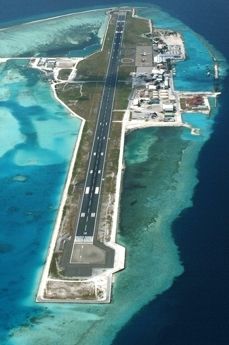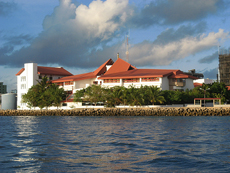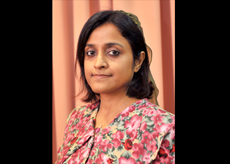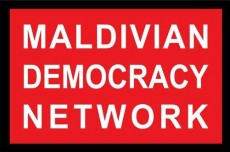President Abdulla Yameen has refuted allegations that his administration was creating a high number of political posts, but said the government must provide incentives for those who helped him win the presidency.
“We are not creating useless political positions just to appoint persons to them,” Yameen told the press at a Wednesday event in which former President Dr Mohamed Waheed and senior members of his party joined his ruling Progressive Party of Maldives (PPM).
Yameen said members of the ruling coalition were only raised to political positions after the resignation or dismissal of those who currently filled the posts.
“What I want to tell all politicians and citizens regarding this matter is that in reality, it is the work of a united group that made it possible for us to get this presidential term for ourselves. And so even citizens will accept that this government must provide incentives for those who took part in that work and put in responsible work. That cannot be called partiality towards them,” Yameen said.
He went on to say that political positions must be filled with individuals who share the ideology of the government, and who will work to reach the same goals, adding that this must be inclusive of government coalition members.
Yameen pointed out that the coalition would not be complaining about failure to receive jobs if his government was increasing the number of existing positions.
However, he pledged to assign all promised positions under the coalition agreement to all the involved political parties.
He called on those who are currently filling political positions who are not part of the government coalition to leave their jobs and “make space” for those within it.
The current administration has 112 known political positions within the government; 15 cabinet ministers, 3 other ministerial rank positions, 33 appointees at the level of state minister, 50 appointees at the level of deputy minister and 11 high commissioners and ambassadors, as per the President’s Office website.
These 112 positions do not account for presidential appointees to the boards of state enterprises and other institutions.
Government coalition
Besides ruling party PPM, the government coalition consists of Maldives Development Alliance (MDA), Jumhooree Party (JP), Dhivehi Qaumee Party (DQP), Adhaalath Party (AP) and Gaumee Ihthihaadh Party (GIP).
With GIP leader former President Waheed and many of its senior members joining PPM on Wednesday, the party council has announced their decision to dissolve the party.
“I have not set any conditions in joining this party, and am doing so as I believe it will be most beneficial for the country at this time. I have neither asked for any political appointment nor have I asked for any share of the government,” Waheed said, speaking to media at Wednesday’s event.
Earlier in December, rumours arose that Adhaalath Party had left the government coalition, after the party announced it will be contesting in the upcoming local council and parliamentary elections separate from the coalition. The party later refuted the claims on December 8, asserting that although they will contest separately, the party fully supports the government. The party, along with a number of state and deputy minister posts, holds two cabinet seats.
On November 26, JP Leader Gasim Ibrahim said in a party rally that the government had thus far failed to allocate the promised state positions to the party, adding that he believed this could be due to the government being “hectically engaged in other government matters”.
“Our President Abdulla Yameen is an experienced man. Maumoon [Abdul Gayyoom, former President and Leader of PPM], too, is a person who has far more political experience than seen otherwise in the history of the Maldives. They will certainly not act in a way which will deprive us of benefits,” he said then.
 On December 8, the Transport and Communication Ministry revealed that it would finish drafting plans and begin the groundwork within a 100 days to develop the Ibrahim Nasir International Airport (INIA) to be able to cater to 5 million passengers.
On December 8, the Transport and Communication Ministry revealed that it would finish drafting plans and begin the groundwork within a 100 days to develop the Ibrahim Nasir International Airport (INIA) to be able to cater to 5 million passengers. held today that the government was drafting a policy to “bring major development to IGMH in a very short period of time to an extent never before seen”.
held today that the government was drafting a policy to “bring major development to IGMH in a very short period of time to an extent never before seen”. Maldives National Defence Force (MNDF)’s 100 day strategic plan includes the submission of various amendments to relevant laws – including the Armed Forces Act and Narional Security Act – to the parliament, and the establishment of a ‘justice system’ within the force.
Maldives National Defence Force (MNDF)’s 100 day strategic plan includes the submission of various amendments to relevant laws – including the Armed Forces Act and Narional Security Act – to the parliament, and the establishment of a ‘justice system’ within the force. Meanwhile, Minister of Foreign Affairs Dunya Maumoon stated that the Maldives has given “greater impetus and focus to strengthening our systems and institutions to better safeguard human rights and fundamental liberties” since former President Maumoon Abdul Gayoom began the introduction of democratic governance in the country in 2004.
Meanwhile, Minister of Foreign Affairs Dunya Maumoon stated that the Maldives has given “greater impetus and focus to strengthening our systems and institutions to better safeguard human rights and fundamental liberties” since former President Maumoon Abdul Gayoom began the introduction of democratic governance in the country in 2004. maintaining that it is the result of having an elected government in place after a politically turbulent period.
maintaining that it is the result of having an elected government in place after a politically turbulent period.